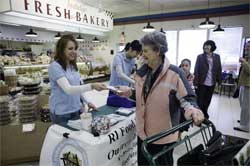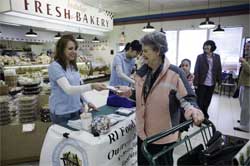 KINGSTON, R.I.—May 12, 2009 –Combating hunger has been on the University’s front burner ever since the Feinstein Center for a Hunger Free America was established in 2001.
KINGSTON, R.I.—May 12, 2009 –Combating hunger has been on the University’s front burner ever since the Feinstein Center for a Hunger Free America was established in 2001.
Today that help is even more critical. With 10.5 percent of its workforce without a job —Rhode Island holds the dubious distinction of having one of the highest unemployment rates in the nation.
Although times are tough, applying for food stamps shouldn’t be.
Kathleen Gorman, director of the hunger center, heads an extensive outreach project that assists the state’s Department of Human Services to improve access to, participation and retention in, the Food Stamp Program.
“There are 100,000 Rhode Islanders now receiving benefits from the Supplemental Nutrition Assistance Program (SNAP), the new name of the food stamp program,” says Gorman. “We estimate that there are at least 20,000 more Rhode Islanders who are eligible. With the economy tanking, that’s probably a low estimate. More than 3,700 people enrolled in the program in March 2009 alone.
The center collaborates with 38 partners and nearly 300 agencies to get the word out and people enrolled. Student employees and interns provide information, prescreening, and application assistance to help people at pantries, shelters, soup kitchens, group homes, senior high risers, and more find out if they qualify for the program. In addition, trainings are held at social service agencies across the state. “We go anywhere to help people in need or to train people who work directly with low income populations,” says Gorman.
The center also partners with grocery stores. The Brigido family, hosts outreach workers at their three markets in Northern Rhode Island. “We want to be sure all our neighbors take advantage of this federal nutrition program,” says Lee Ann Brigido.
The center publishes brochures and printed materials and hosts a busy food stamp hotline at 866-306-0270 where people can call for information or request an application.
It places advertisements on the back of statewide buses and on radio programs directed toward their target populations: seniors, working poor households and immigrant populations.
Recently Rhode Islanders receiving SNAP benefits got a boost in their monthly benefits, thanks to the American Recovery and Reinvestment Act. The state also removed a number of bureaucratic obstacles that could otherwise derail the recently poor from receiving benefits.
“The increased benefit is arguably a powerful source of economic stimulus since benefits are spent almost immediately in the local economy, “ says Gorman. “In Rhode Island, that brings the total average monthly benefit to $125 for each participant, which means more than $12.5 million federal dollars is being spent at local grocery stores in just one month.”
URI offers an interdisciplinary minor in hunger studies. The minor is intended to prepare students for leadership roles and understanding and eradicating hunger, and in facilitating students and other URI community members to be life-long advocates for hunger cessation. Courses are offered on URI’s Kingston and Providence campuses. To learn how to make a difference while earning college credit, go to uri.edu/endhunger.
Pictured above
URI Food Stamp Outreach worker Alicia Olson of Lincoln greets a market customer at Bridigo’s marketplace in Pascoag. URI Department of Communications & Marketing photo by Michael Salerno Photography.
READY TO HELP: From left: Nutrition educator Kate Balestracci, Mark Bridigo, Food Stamp Outreach workers Alicia Olson of Lincoln and Lisa Lao of Cranston at Bridigo’s Marketplace in Pascoag. URI Department of Communications & Marketing photo by Michael Salerno Photography.


